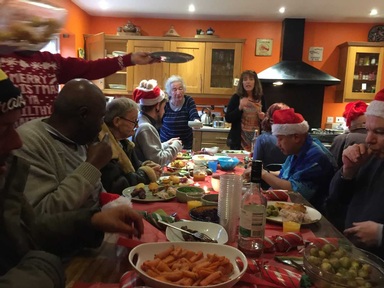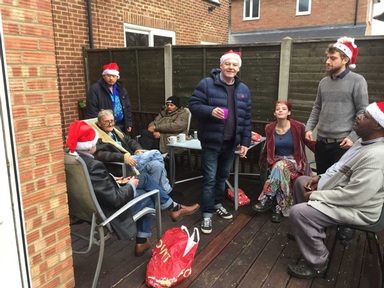Care home owner invites ex-prisoners to his house for Christmas dinner every year
A care home owner, who wants to eradicate ‘us’ and ‘them’, has been inviting residents over to his house for Christmas dinner for the last 10 years.

Professionals who work with people with mental health issues are advised to conceal their personal lives and avoid any details about where they live and if they have children or a partner.
However Adrian Spence, who runs Connifinn Care in East London is different. All the residents have been in the criminal justice system, with some spending time locked up in secure psychiatric hospitals such as Broadmoor.
Yet he has ripped up the rule book and actively encourages staff to share their personal lives with residents. For Mr Spence’s own children, the care home is their second home, with his 14-year-old daughter never having spent a Christmas Day without the residents.
He says: “Everyone gets a present. One of my kids will play the piano and there's lots of home cooked food. It replaces what the residents haven’t had and they trust us a lot more. It's not 'us' and 'them'.
“My children have never had a Christmas without the residents. Two of my children have worked at the service and before everyone sets off to my house for Christmas Day, the staff check everything, make sure that medicines are packed.
“We risk assess and if there are any issues, we'll provide one to one support to get them to my house. We have a lot of staff available and the service users know my family, and everyone gets a present.”
He recognizes that some might not want to go to his house and says “they don't have to, so we accommodate that”.
'I felt we needed to break the barriers down'
“There used to be a barrier between staff and residents due to that belief that staff shouldn’t give any personal information away. I felt we needed to break these barriers down as ironically we know everything about them so why shouldn’t they know everything about us.”
He reveals that “some of the residents are under Ministry of Justice sections 37/41 or they are under a community treatment order (CTO). Some are under DOLs (Deprivation of Liberty) with movement and finance. Some will never go out on their own. We have some in the setting who can go out on their own but they get disorientated. With their agreements we put a tracker on them so if they wander and get lost we can easily find them. We are always coming up with new ways to increase their quality of life.”
One resident who cannot be named to protect his anonymity, is in his mid-50s and spent 30 years in secure psychiatric hospitals. He has mental and physical health issues and explains that “in the secure unit there was no freedom, privacy or compromise”.
“Here when I'm out of order, staff explain why I'm being out of order and calm me down. They don't hold it against me if I swear at them. They buy me clothes and help me be a very stylish man. Neighbours used to cross the road but now they smile at me.”
He adds: “I feel safe in this house because I have friends now. Staff are my friends. They drive me around in their cars.”
Aiste Trimakaite, deputy manager at the home, reveals that the resident, who moved to Connifinn Care three years ago, was very distressed when he first arrived and isolated himself from residents and staff.
“He would never join others at the table for lunch or supper and he would shout if anyone tried to come any closer to him than two metres,” she says.

It took around four months for him to build up a strong, trusting relationship with staff and fellow residents. At first he agreed to participate in one-to-one art therapy in his room and then eventually he started to join group classes in communal areas.
“Every day we asked him to join in different activities. Step by step, he started to join in with our art classes, working with paint and clay.
“He really enjoyed being a front seat passenger in staff cars. This was where he really began to engage with staff. Driving around the local area, listening to his favourite music helped him relax and open up a lot.
“Most importantly after every little trip, he came back home with a very big smile on his face,” says Ms Trimakaite.
She reveals that the impact of moving to the home has been so big that he has gone from shouting at anyone who approached him, to asking staff and residents to be in photos with him and “even hugging them”.
The Grove care home provides care for up to eight adults with mental health needs and had an unannounced inspection in June.
The CQC rated the home as ‘outstanding’, a rating currently held by only three per cent of care homes in England. Inspectors revealed in their report that a support worker at the home described it as “person centred care” saying: “The registered manager's idea is to make a home for people and it's like a family home. There's nowhere else I'd rather work”.
A support worker is also quoted saying: “Every year we all go to the registered manager's house for Christmas dinner, including the residents. The guys here never had a family Christmas and we've been going to the registered manager's home for Christmas for 10 years.”
Latest Features News
 25-Nov-19
2019 Election: Boris Johnson leaves social care in 'too difficult box' but Labour vows to end 'crisis'
25-Nov-19
2019 Election: Boris Johnson leaves social care in 'too difficult box' but Labour vows to end 'crisis'
 18-Oct-19
Podcast: Wendy Mitchell and dementia: 'My biggest fear is not knowing who my daughters are'
18-Oct-19
Podcast: Wendy Mitchell and dementia: 'My biggest fear is not knowing who my daughters are'
 27-Sep-19
Exclusive: Care minister backs care workers' call for time off to grieve and attend funerals
27-Sep-19
Exclusive: Care minister backs care workers' call for time off to grieve and attend funerals
 19-Sep-19
Podcast: Gyles Brandreth says poetry helps ward off dementia
19-Sep-19
Podcast: Gyles Brandreth says poetry helps ward off dementia
 30-Aug-19
Edinburgh Fringe funnyman joins comics facing toughest audience at care home gig
30-Aug-19
Edinburgh Fringe funnyman joins comics facing toughest audience at care home gig